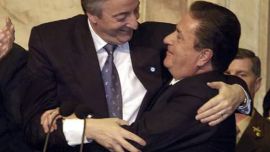President Javier Milei has kickstarted its war with Argentina’s football clubs and authorities, issuing a government decree that orders the sport’s governing body to accept privately owned clubs into its top-tier league.
Via a decree published in the Official Gazette, Milei sets a one-year timeline for the Argentine Football Association (AFA) to amend its statutes and accept private sporting corporations or limited companies (SAD, in their Spanish acronym) in the professional league, which have been banned until now.
Under AFA’s existing rules, only non-profit civil associations are allowed to participate.
Within a year, AFA and all other associations and federations must adapt their norms so that any club can become a limited company, maintaining its participation "in every competition in which it intervened under its previous legal structure," details the presidential decree.
"No rights of a sporting organisation may be blocked, hindered or undermined due to its legal format, whether it be a civil association or a limited company, always when it is recognised by the law," continues the decree.
The move by President Milei’s administration is an attempt to neutralise AFA’s current position and force it to adhere to national law. The measure is a continuation of a mega-decree issued in late 2023 which, among 300 other reforms, opened the door to Argentine football clubs being able to convert themselves into sporting corporations instead of non-profit associations, as currently.
‘Total lie’
AFA President Claudio ‘Chiqui’ Tapia was defiant on Wednesday as he addressed the issue.
"We know which is the model of football we want for our institutions: non-profit civil associations," said Tapia at an event at AFA’s headquarters.
"If anyone thinks that football is going to be saved with the sporting corporations, that is a total lie. They want to be owners and bosses of the players, they want to be the owners of the clubs," remarked the AFA chief, who has overseen one World Cup and two Copa América triumphs for Argentina’s national men’s football during his tenure.
Last month, Tapia reiterated his position in another speech, arguing that the National Constitution grants institutions the right to decide their membership.
His comments met with pushback from Milei’s new Deregulation & State Transformation Minister Federico Sturzenegger.
“AFA has to comply because it is part of Argentina’s sports system. And according to sport legislation, you cannot reject a club, independently of the legal form in which it decides to organise itself. If a club wishes to change, AFA cannot refuse because that would be violating the law,” declared the former Central Bank governor.
Milei and Sturzenegger defend the change as a way of granting more freedom to club members, permitting them to decide if they want to attract private capital via transformation into SADs.
"The President always proposes greater liberties, always giving people more options. So if the owners of the clubs are its members, we are giving them more freedom to choose if they want to bring in capital," expressed the official.
Argentina’s clubs are non-profit civil associations, in which fans pay membership duties that give them a right to vote for who they want to run their institutions, which often provide services in their local community and organise a host of other sports.
Opposition
Most of Argentina’s clubs have come out against Milei’s move.
AFA statutes do not currently permit the teams of SADs to participate in its competitions, a position reiterated at a meeting of the association’s Executive Committee last month.
With this new regulation, the government is obliging AFA and all the country’s sports federations to adapt to the inclusion of SADs within a year. During this period the associations will have to amend their statutes to permit the participation of clubs with this legal structure in its competitions, said the government.
"The period of a year established in Article 345 of DNU emergency decree N° 70 of December 20, 2023, will count down from the date of entry into force of the present decree," details the official document.
President Milei has repeatedly expressed his stance in favour of the participation of private capital in football, in tune with his government’s ultra-liberal policies. The La Libertad Avanza leader expressed himself in those terms even before winning the presidential election in 2023, even though the vast majority of clubs were opposed.
His push is backed by several other leading politicians, including former president Mauricio Macri, the conservative PRO party leader who spent more than a decade leading the giant Boca Juniors football club in Buenos Aires.
Association not asset
Milei’s move to reshape the local game has triggered strong reactions across the domestic football landscape.
Among those opposing the move is Boca, which maintained on its X account: "Boca Juniors ratifies its character of non-profit association on the premise that our club is its people and members which make it greater every day."
Current champions River Plate, Boca’s arch-rivals, have taken the same stance.
"Club Atlético River Plate is a non-profit association which will always belong to its members who sustain these 122 years of greatness,” it posted on social media.
AFA, on its side, has reiterated its stance that only non-profit associations can be members, resisting until now all attempts to privatise football.
Milei, however, has set the clock ticking and a shoot-out looms on the horizon.
– TIMES/AFP/PERFIL
related news

Messi to unveil 21-metre statue of himself on India 'GOAT' tour

Ex-team-mates Milito and Verón lead boyhood clubs into Clausura final clash

New development in AFA-Sur Finanzas case as court order searches at Pilar neighbourhood






















Comments